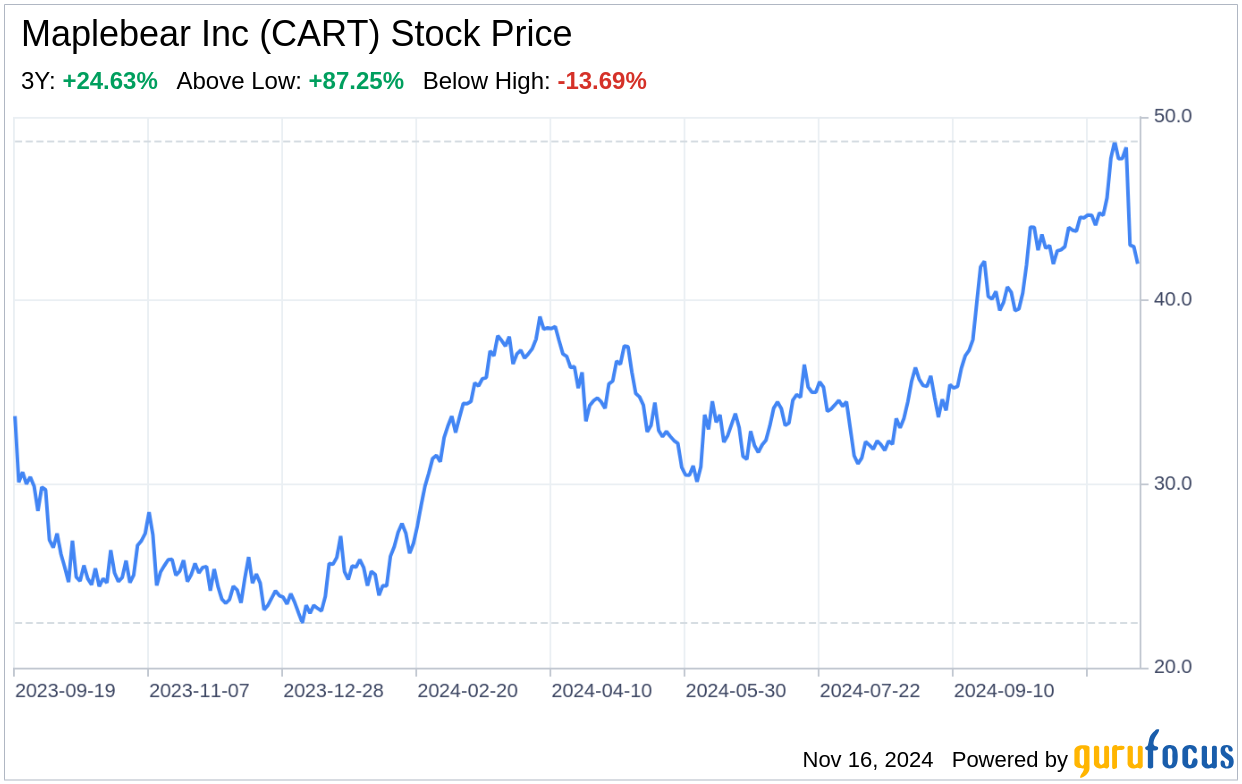Maplebear Inc (CART, Financial), operating under the brand Instacart, is a prominent player in the grocery delivery platform sector in North America. On November 13, 2024, the company filed its 10-Q report, revealing insightful financial data and strategic directions. The financial overview for the three months ended September 30, 2024, indicates a robust performance with a 14% net income margin, a significant improvement from the previous year's net loss of 262%. This turnaround can be attributed to a decrease in total operating expenses from 395% to 59% of revenue and an increase in gross profit margin from 73% to 75%. Maplebear Inc's strategic initiatives and operational efficiencies have evidently paid off, positioning the company for sustainable growth and profitability.

Strengths
Market Leadership and Brand Recognition: Maplebear Inc (CART, Financial) has established itself as a market leader in the grocery delivery space, with a strong brand presence and nearly 8 million monthly active users. The company's brand recognition is a significant asset, as it attracts both new customers and retains existing ones. This strength is underpinned by strategic partnerships with regional and national grocers, which enhance the diversity and reach of Instacart's offerings. The platform's high usage also enables Maplebear Inc to sell targeted advertising, primarily to consumer-packaged goods companies, creating an additional revenue stream.
Technological Innovation: Maplebear Inc's investment in technology is a cornerstone of its competitive edge. The company's platform facilitates seamless transactions between customers, grocers, and shoppers, which is critical for maintaining user engagement and operational efficiency. The development and integration of new features, such as AI-driven shopping lists and predictive analytics, further enhance the customer experience and optimize logistics. Maplebear Inc's commitment to innovation is evident in its financial filings, with significant capitalization of internal-use software costs, indicating a forward-looking approach to sustaining its market position.
Weaknesses
Dependence on Independent Contractors: Maplebear Inc's reliance on a network of over 600,000 independent contractors for order fulfillment is a potential weakness. This model presents challenges in terms of quality control, shopper retention, and regulatory compliance. The classification of shoppers as independent contractors is subject to legal and political scrutiny, which could lead to increased costs or required changes to the business model if regulations shift towards mandating employee status for gig economy workers.
High Competition and Low Switching Costs: The grocery delivery market is highly competitive, with low barriers to entry and low customer switching costs. Maplebear Inc faces competition from a variety of players, including other delivery platforms, traditional grocery retailers expanding their online presence, and new entrants offering niche services. This competitive landscape necessitates continuous investment in marketing, technology, and customer acquisition to maintain market share, which can pressure margins and profitability.
Opportunities
Expansion into New Markets and Segments: Maplebear Inc has the opportunity to grow its user base by expanding into new geographic markets and diversifying its product offerings. The company's scalable platform and established brand can facilitate entry into international markets or adjacent segments such as meal kits or specialty foods. Additionally, the trend towards online grocery shopping, accelerated by the COVID-19 pandemic, is expected to continue, providing a favorable environment for growth.
Strategic Acquisitions and Partnerships: Maplebear Inc's financial filings indicate a strategic approach to growth through acquisitions, investments, and partnerships. These initiatives can provide access to new technologies, expand the company's service offerings, and open up cross-promotional opportunities. For instance, partnerships with retailers not only increase the variety of products available on the platform but also strengthen the company's value proposition to both consumers and grocers.
Threats
Regulatory Changes: The regulatory environment poses a significant threat to Maplebear Inc's business model. Changes in labor laws affecting the classification of gig economy workers could increase operating costs and necessitate a restructuring of the company's labor model. Additionally, data privacy regulations and sales tax laws could impact the company's operations and financial performance, as evidenced by the reserves maintained for potential tax liabilities.
Economic and Market Fluctuations: Maplebear Inc's performance is subject to macroeconomic conditions, including inflation, interest rates, and consumer spending patterns. Economic downturns or shifts in consumer behavior could reduce demand for delivery services. Moreover, the competitive pressures in the grocery delivery market could intensify, leading to price wars and further margin compression.
In conclusion, Maplebear Inc (CART, Financial) demonstrates a strong market position with a well-recognized brand and a technologically advanced platform. The company's recent financial performance reflects significant improvements in profitability and operational efficiency. However, challenges such as regulatory risks and competitive dynamics require careful navigation. Maplebear Inc's opportunities for growth through market expansion and strategic initiatives present potential pathways for success, but the company must remain vigilant against external threats that could impact its trajectory. Overall, Maplebear Inc is well-positioned to leverage its strengths and opportunities while addressing its weaknesses and threats in the evolving grocery delivery landscape.
This article, generated by GuruFocus, is designed to provide general insights and is not tailored financial advice. Our commentary is rooted in historical data and analyst projections, utilizing an impartial methodology, and is not intended to serve as specific investment guidance. It does not formulate a recommendation to purchase or divest any stock and does not consider individual investment objectives or financial circumstances. Our objective is to deliver long-term, fundamental data-driven analysis. Be aware that our analysis might not incorporate the most recent, price-sensitive company announcements or qualitative information. GuruFocus holds no position in the stocks mentioned herein.
